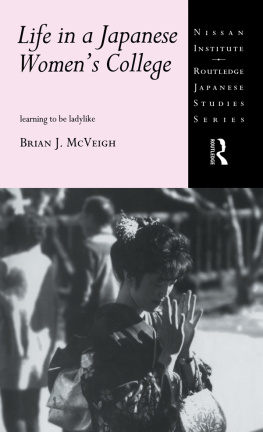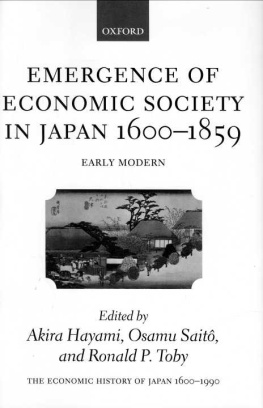The Nature of the Japanese State
The Nissan Institute/Routledge Japanese Studies Series
Editorial Board
J. A. A. Stockwin, Nissan Professor of Modern Japanese Studies, University of Oxford and Director, Nissan Institute of Japanese Studies
Teigo Yoshida, formerly Professor of the University of Tokyo, and now Professor, Obirin University, Tokyo
Frank Langdon, Professor, Institute of International Relations, University of British Columbia, Canada
Alan Rix, Professor of Japanese, The University of Queensland
Junji Banno, Professor, Institute of Social Science, University of Tokyo Leonard Schoppa, University of Virginia
Other titles in the series:
The Myth of Japanese Uniqueness,Peter N. Dale
The Emperors Adviser: Saionji Kinmochi and Pre-war Japanese Politics,Lesley Connors
A History of Japanese Economic Thought,Tessa Morris-Suzuki
The Establishment of the Japanese Constitutional System,Junji Banno, translated by J. A. A. Stockwin
Industrial Relations in Japan: the Peripheral Workforce,Norma Chalmers
Banking Policy in Japan: American Efforts at Reform During the Occupation,William M. Tsutsui
Educational Reform in Japan, Leonard Schoppa
How the Japanese Learn to Work,Ronald P. Dore and Mari Sako
Japanese Economic Development: Theory and Practice,Penelope Francks
Japan and Protection: the Growth of Protectionist Sentiment and the Japanese Response,Syed Javed Marwood
The Soil, by Nagastsuka Takashi: a Portrait of Rural Life in Meiji Japan,translated and with an introduction by Ann Waswo
Biotechnology in Japan,Malcolm Brock
Britains Educational Reform: a Comparison with Japan,Michael Howarth
Language and the Modern State: the Reform of Written Japanese,Nanette Twine
Industrial Harmony in Modern Japan: the Invention of a Tradition,W. Dean Kinzley
Japanese Science Fiction: a View of a Changing Society,Robert Matthew
The Japanese Numbers Game: the Use and Understanding of Numbers in Modern Japan,Thomas Crump
Ideology and Practice in Modern Japan,Roger Goodman and Kirsten Refsing
Technology and Industrial Development in pre-War Japan,Yukiko Fukasaku
Japans Early Parliaments 18901905,Andrew Fraser, R.H.P. Mason and Philip Mitchell
Japans Foreign Aid Challenge,Alan Rix
Emperor Hirohito and Shwa Japan,Stephen S. Large
Japan: Beyond the End of History,David Williams
Ceremony and Ritual in Japan: Religious Practices in an Industrialized Society,Jan van Bremen and D.P Martinez
Understanding Japanese Society: Second Edition,Joy Hendry
The Fantastic in Modern Japanese Literature: the Subversion of Modernity,Susan J. Napier
Militarization and Demilitarization in Contemporary Japan,Glenn D. Hook
Growing a Japanese Science City: Communication in Scientific Research,James W. Dearing
Architecture and Authority in Japan,William H. Coaldrake
WomensGidayand the Japanese Theatre Tradition,A. Kimi Coaldrake
Democracy in Post-war Japan,Rikki Kersten
Treacherous Women of Imperial Japan,Hlne Bowen Raddeker
JapaneseGerman Business Relations,Kud Akira
Japan, Race and Equality,Naoko Shimazu
Interpreting History in Sino-Japanese Relations,Caroline Rose
Japan, Internationalism and the UN,Ronald Dore
Life in a Japanese Womens College,Brian J. McVeigh
On the Margins of Japanese Society,Carolyn S. Stevens
The Dynamics of Japans Relations with Africa,Kweku Ampiah
The Right to Life in Japan,Noel Williams
The Nature of the Japanese State: Rationality and Rituality,Brian J. McVeigh
Society and the State in Inter-War Japan,Elise K. Tipton
First published 1998
by Routledge
2 Park Square, Milton Park, Abingdon, Oxon, 0X14 4RN
Simultaneously published in the USA and Canada
270 Madison Ave, New York NY 10016
Transferred to Digital Printing 2007
1998 Brian J. McVeigh
All rights reserved. No part of this book may be reprinted or reproduced or utilized in any form or by any electronic, mechanical, or other means, now known or hereafter invented, including photocopying and recording, or in any information storage or retrieval system, without permission in writing from the publishers.
British Library Cataloguing in Publication Data
A catalogue record for this book is available from the British Library
Library of Congress Cataloging in Publication Data
A catalog record for this book has been requested
ISBN 0415171067
Cover photograph: Orion/Camera Press
Publishers Note
The publisher has gone to great lengths to ensure the quality of this reprint but points out that some imperfections in the original may be apparent






